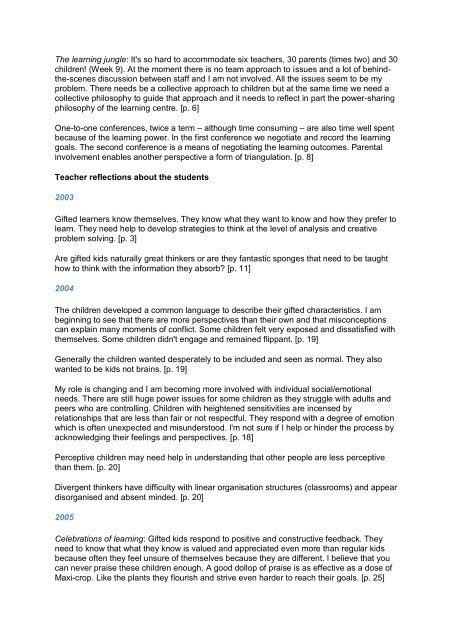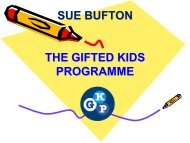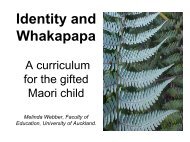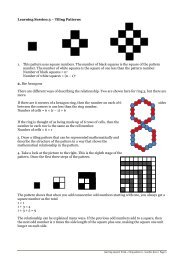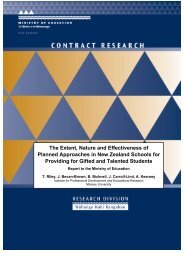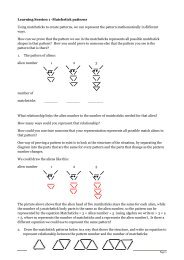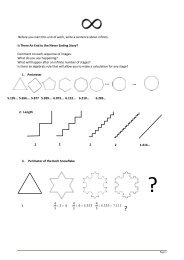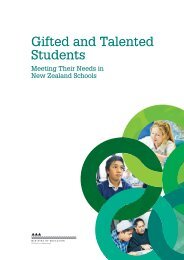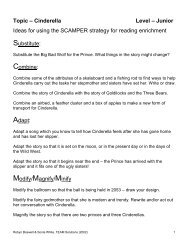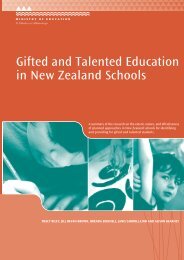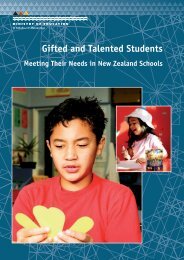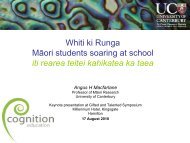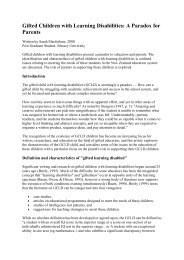Ilam School Introduction The following story is about the gifted and ...
Ilam School Introduction The following story is about the gifted and ...
Ilam School Introduction The following story is about the gifted and ...
You also want an ePaper? Increase the reach of your titles
YUMPU automatically turns print PDFs into web optimized ePapers that Google loves.
<strong>The</strong> learning jungle: It's so hard to accommodate six teachers, 30 parents (times two) <strong>and</strong> 30children! (Week 9). At <strong>the</strong> moment <strong>the</strong>re <strong>is</strong> no team approach to <strong>is</strong>sues <strong>and</strong> a lot of behind<strong>the</strong>-scenesd<strong>is</strong>cussion between staff <strong>and</strong> I am not involved. All <strong>the</strong> <strong>is</strong>sues seem to be myproblem. <strong>The</strong>re needs be a collective approach to children but at <strong>the</strong> same time we need acollective philosophy to guide that approach <strong>and</strong> it needs to reflect in part <strong>the</strong> power-sharingphilosophy of <strong>the</strong> learning centre. [p. 6]One-to-one conferences, twice a term – although time consuming – are also time well spentbecause of <strong>the</strong> learning power. In <strong>the</strong> first conference we negotiate <strong>and</strong> record <strong>the</strong> learninggoals. <strong>The</strong> second conference <strong>is</strong> a means of negotiating <strong>the</strong> learning outcomes. Parentalinvolvement enables ano<strong>the</strong>r perspective a form of triangulation. [p. 8]Teacher reflections <strong>about</strong> <strong>the</strong> students2003Gifted learners know <strong>the</strong>mselves. <strong>The</strong>y know what <strong>the</strong>y want to know <strong>and</strong> how <strong>the</strong>y prefer tolearn. <strong>The</strong>y need help to develop strategies to think at <strong>the</strong> level of analys<strong>is</strong> <strong>and</strong> creativeproblem solving. [p. 3]Are <strong>gifted</strong> kids naturally great thinkers or are <strong>the</strong>y fantastic sponges that need to be taughthow to think with <strong>the</strong> information <strong>the</strong>y absorb? [p. 11]2004<strong>The</strong> children developed a common language to describe <strong>the</strong>ir <strong>gifted</strong> character<strong>is</strong>tics. I ambeginning to see that <strong>the</strong>re are more perspectives than <strong>the</strong>ir own <strong>and</strong> that m<strong>is</strong>conceptionscan explain many moments of conflict. Some children felt very exposed <strong>and</strong> d<strong>is</strong>sat<strong>is</strong>fied with<strong>the</strong>mselves. Some children didn't engage <strong>and</strong> remained flippant. [p. 19]Generally <strong>the</strong> children wanted desperately to be included <strong>and</strong> seen as normal. <strong>The</strong>y alsowanted to be kids not brains. [p. 19]My role <strong>is</strong> changing <strong>and</strong> I am becoming more involved with individual social/emotionalneeds. <strong>The</strong>re are still huge power <strong>is</strong>sues for some children as <strong>the</strong>y struggle with adults <strong>and</strong>peers who are controlling. Children with heightened sensitivities are incensed byrelationships that are less than fair or not respectful. <strong>The</strong>y respond with a degree of emotionwhich <strong>is</strong> often unexpected <strong>and</strong> m<strong>is</strong>understood. I'm not sure if I help or hinder <strong>the</strong> process byacknowledging <strong>the</strong>ir feelings <strong>and</strong> perspectives. [p. 18]Perceptive children may need help in underst<strong>and</strong>ing that o<strong>the</strong>r people are less perceptivethan <strong>the</strong>m. [p. 20]Divergent thinkers have difficulty with linear organ<strong>is</strong>ation structures (classrooms) <strong>and</strong> appeard<strong>is</strong>organ<strong>is</strong>ed <strong>and</strong> absent minded. [p. 20]2005Celebrations of learning: Gifted kids respond to positive <strong>and</strong> constructive feedback. <strong>The</strong>yneed to know that what <strong>the</strong>y know <strong>is</strong> valued <strong>and</strong> appreciated even more than regular kidsbecause often <strong>the</strong>y feel unsure of <strong>the</strong>mselves because <strong>the</strong>y are different. I believe that youcan never pra<strong>is</strong>e <strong>the</strong>se children enough. A good dollop of pra<strong>is</strong>e <strong>is</strong> as effective as a dose ofMaxi-crop. Like <strong>the</strong> plants <strong>the</strong>y flour<strong>is</strong>h <strong>and</strong> strive even harder to reach <strong>the</strong>ir goals. [p. 25]


